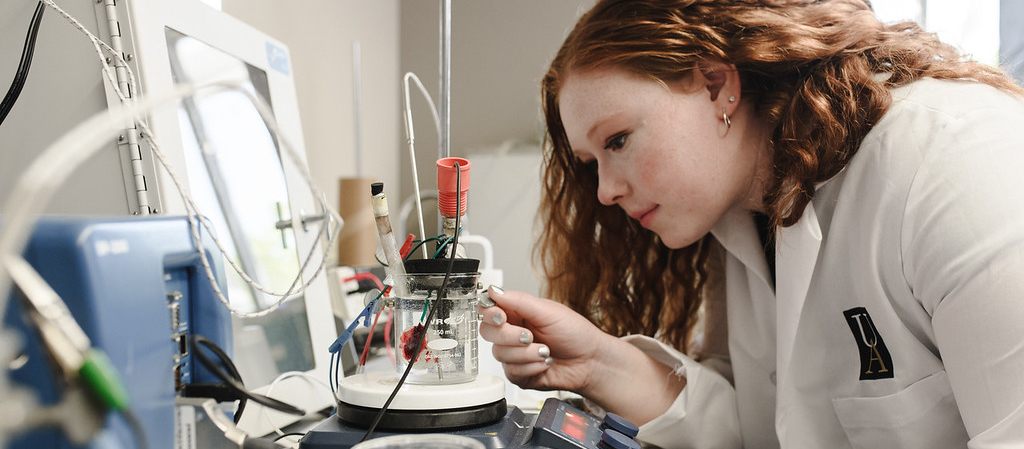
Biomedical Engineering Undergraduate Program
Biomedical Engineering is a highly interdisciplinary field of engineering which combines engineering principles with a fundamental understanding of math, physical and biological sciences. Biomedical Engineers are prepared to design, manage, and regulate medical devices and technologies, and work closely alongside healthcare professionals in addition to other engineers. Our students are prepared to embark on careers in medical device and technology companies, engineering firms, research, and professional health sciences. Through our modern undergraduate curriculum, our students will:
- Apply principles of engineering, mathematics, and physical and life sciences towards solving problems in healthcare and related industries
- Integrate and apply foundational knowledge learned in the classroom to engage in dynamic, hands-on laboratories and design-centered curriculum
- Learn and implement the FDA design process to develop, manage, and regulate medical devices and technologies, culminating in the Senior Design Capstone project to address a current real-world need in the medical field
- Have multiple opportunities to engage with biomedical engineering beyond the classroom, such as involvement in professional student societies (BMES, SWE, NSBE, SHPE), design teams (MDDT), and paid undergraduate research in faculty laboratories
Program Highlights
- Our modern curriculum focuses on the design of medical devices and technologies, and integrates hands-on laboratory experiences with industry-standard tools to reinforce technical concepts from the classroom.
- Students have the flexibility to tailor their coursework towards their specific goals and career paths, such as design of prosthetics and implantable devices or cancer research. Many of our students participate in the co-op program and receive paid, flexible, industry experience. Students make on average $43,200 over three co-op rotations while in school.
- Multiple undergraduate research opportunities are available for students to further their technical and team skills outside the classroom. Students will work alongside our engaged faculty and graduate students on federally-funded projects in the areas of tissue engineering, biomaterials, biomechanics, biofabrication, artificial intelligence, and clinical and translational science. They also have opportunities to present their work to faculty and industry representatives, and at local, regional, and national conferences.
- Biomedical Engineering students can join any of the student design teams at The University of Akron to build medical devices, robots, racecars, rockets, and more. Our design teams rank among the best in the nation and our students can apply what they learn in the classroom while making friends, traveling, and building their resumes.
- Many scholarships are available to significantly reduce the cost of attending school, and some of these scholarships automatically consider all students upon application.
- Tutoring, academic support, and peer-mentorship in Biomedical Engineering are available at no additional cost to undergraduate students.
Admission Requirements
All students who meet the minimum requirements for admittance into The University of Akron and intend to major in biomedical engineering are accepted into the College.
If you are coming directly from high school, your high school records determine which first semester classes are right for you.
Career Opportunities
A degree in biomedical engineering prepares you for a broad range of careers in medical device and life sciences companies, engineering firms, government agencies, and post-baccalaureate studies in engineering, law, medicine, or professional health sciences. Our graduates go on to work in companies such as Abbott, Boston Scientific, GE Healthcare, Lumitex, Parker Hannifin, PerkinElmer, Pfizer, RoviSys, STERIS, and Zimmer Biomet.
Student spotlight


“It is my dream to help people live happier and more fulfilling lives. I hope to improve the medical resources available to others, especially for the elderly – they hold a special place in my heart.”
— Ellie Riekert
Majoring in Biomedical Engineering
Alumni spotlight


“Engineering experiences teach us that problems are opportunities in disguise. By approaching these challenges with creativity, critical thinking, and determination, we can not only overcome obstacles but also create innovative solutions that drive progress and success.”
— Vince Grosso
Bachelor of Science in Biomedical Engineering, ‘23
Attending the University of Pittsburgh School of Dental Medicine
Curriculum Guides & Courses
Curriculum guide: Biomedical Engineering
Courses: Review all our biomedical engineering classes.
Accreditation
The BS in Biomedical Engineering program is accredited by the Engineering Accreditation Commission of ABET, https://www.abet.org, under the General Criteria and Program Criteria for Bioengineering and Biomedical and Similarly Named Engineering Programs. The program has specific educational objectives and student outcomes that prepare graduates to enter the professional practice of engineering.
For more information
Direct questions to:
Dr. Joan Carletta
Associate Dean of Undergraduate Studies
330-972-7816
carlett@uakron.edu
